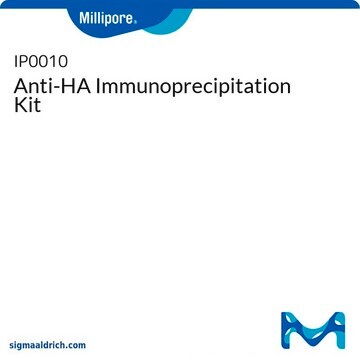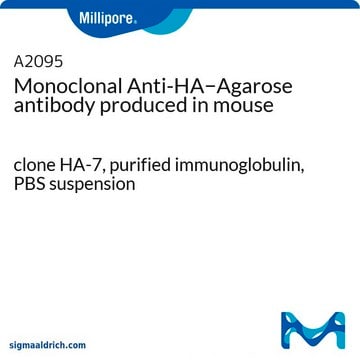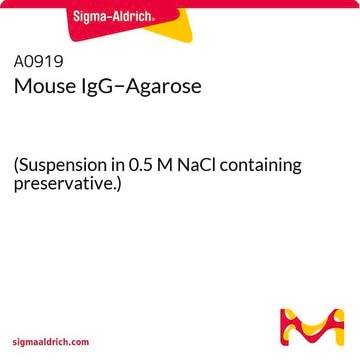E6654
EZview™ Red Anti-c-Myc Affinity Gel
Sinónimos:
Anti-c-Myc affinity resin, Anti-c-Myc agarose beads
Iniciar sesiónpara Ver la Fijación de precios por contrato y de la organización
About This Item
UNSPSC Code:
12352203
NACRES:
NA.56
Productos recomendados
shelf life
1 yr at 2‑8 °C
Quality Level
analyte chemical class(es)
proteins (c-Myc)
technique(s)
affinity chromatography: suitable
immunoprecipitation (IP): suitable
capacity
~0.05 mg/mL binding capacity
storage temp.
2-8°C
General description
EZ view Red Anti--c-Myc Affinity Gel is a resin that consists of the Anti-c-Myc rabbit antibody, covalently bonded to 4% Agarose beads. The affinity gel is used to bind c-Myc fusion proteins to samples, such as cell lysates and tissue, for purification of c-Myc-tagged proteins in preparation of immunoprecipitation assays. Red dye enhances visability for more efficient results.
Agarose beads bind at N-terminal, Met-N-terminal and C-terminal c-Myc fusion proteins from E. coli and mammalian cells.
Agarose beads bind at N-terminal, Met-N-terminal and C-terminal c-Myc fusion proteins from E. coli and mammalian cells.
Application
EZview™ Red Anti-c-Myc Affinity Gel is suitable for:
- SUMOylation assay
- Affinity capture (immunoprecipitation) of N- or C-terminal c-Myc-tagged fusion proteins from E. coli or mammalian cells.
When performing small-scale affinity capture, such as immunoprecipitation, the affinity matrix is difficult to see in the microcentrifuge tubes. Accidental aspiration of the resin leads to quantitative variability in results. The EZview™ Red Affinity Gels greatly reduce the risk of pellet loss. EZview resins perform as well as conventional non-colored affinity gels, but allow the user to easily differentiate pellet from supernatant. This correlates to more accurate data because less protein is lost.
Features and Benefits
- Increased visibility - Red color reduces risk of incidental aspiration
- Improved recovery of target protein by reduced accidental loss
- Higher reproducibility - More consistent yields
Other Notes
The affinity gel contains affinity purified anti-c-Myc rabbit polyclonal antibody covalently attached to beaded agarose. The c-Myc tag corresponds to amino acid residues 410-419 (EQKLISEEDL) of the human c-Myc protein.
Physical form
1:1 (v/v) suspension in PBS containing 50% glycerol and 0.0015% Kathon CG/IPCII as an antimicrobial preservative
Legal Information
EZview is a trademark of Sigma-Aldrich Co. LLC
Storage Class
10 - Combustible liquids
wgk_germany
WGK 3
flash_point_f
Not applicable
flash_point_c
Not applicable
Elija entre una de las versiones más recientes:
Certificados de análisis (COA)
Lot/Batch Number
¿No ve la versión correcta?
Si necesita una versión concreta, puede buscar un certificado específico por el número de lote.
¿Ya tiene este producto?
Encuentre la documentación para los productos que ha comprado recientemente en la Biblioteca de documentos.
Los clientes también vieron
Keiko Sato et al.
Microbiology (Reading, England), 155(Pt 4), 1282-1293 (2009-04-01)
The periodontopathic bacterium Porphyromonas gingivalis forms pigmented colonies when incubated on blood agar plates as a result of accumulation of mu-oxo haem dimer on the cell surface. Gingipain-adhesin complexes are responsible for production of mu-oxo haem dimer from haemoglobin. Non-pigmented
Haibo Du et al.
Neural plasticity, 2018, 2062346-2062346 (2018-05-26)
PDZD7 is an important deafness gene, whose mutations are associated with syndromic and nonsyndromic hearing loss. PDZD7 contains multiple PDZ domains that are essential for organizing various proteins into protein complex. Several PDZD7-binding proteins have been identified, including usherin, ADGRV1
Suikang Wang et al.
The Plant cell, 31(2), 486-501 (2019-01-25)
PROTEIN PHOSPHATASE4 (PP4) is a highly conserved Ser/Thr protein phosphatase found in yeast, plants, and animals. The composition and functions of PP4 in plants are poorly understood. Here, we uncovered the complexity of PP4 composition and function in Arabidopsis (Arabidopsis
Natalia Y Martynova et al.
Gene, 638, 52-59 (2017-09-18)
The homeodomain-containing transcription factor Anf (also known as Rpx/Hesx1 in mammals) plays an important role during the forebrain development in vertebrates. Here we demonstrate the ability of the Xenopus laevis Anf, Xanf1/Hesx1, to directly bind SRY-related HMG-box-containing transcription factor SoxD/Sox15
Kobi Simpson-Lavy et al.
Molecular cell, 68(6), 1120-1133 (2017-12-19)
The ability to respond to available nutrients is critical for all living cells. The AMP-activated protein kinase (SNF1 in yeast) is a central regulator of metabolism that is activated when energy is depleted. We found that SNF1 activity in the
Nuestro equipo de científicos tiene experiencia en todas las áreas de investigación: Ciencias de la vida, Ciencia de los materiales, Síntesis química, Cromatografía, Analítica y muchas otras.
Póngase en contacto con el Servicio técnico














